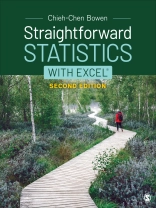Written in an accessible and clear manner,
Straightforward Statistics with Excel® 2e by Chieh-Chen Bowen helps students across the social and behavioral sciences gradually build their skills to develop a better understanding of the world around them. Each chapter purposefully connects with the previous chapter for a gradual accrual of knowledge from simple to more complex concepts. This effective, cumulative approach to statistics through logical transitions eases students into statistics and prepares them for success in more advanced quantitative coursework and their own research. The second edition now features Excel instructions and exercises throughout so students can use this widely-available and applied software for statistics.
This book is designed to walk the reader through statistics at a steady but gentle pace, providing pop quizzes throughout every chapter so readers can check their knowledge along the way. By gradually stepping up difficulty in each chapter, students generate a solid foundation and are prepared for the next chapters. Straightforward Statistics with Excel looks at the big picture so that the basic statistical concepts connect to everyday and relevant research examples in multiple ways. Throughout the book the reader is reminded of what they need to be able to recall with ‘You Must Remember This’ boxes. A rich source of practical resources are located at the end of chapters beginning with ‘ What You Learned, ‘ followed by three sets of exercises so students can immediately apply their knowledge.
The new edition features a reorganized presentation of material, starting with measures of central tendency, separating this from measures of variability so students better understand the differences. A more thorough presentation of one-sample and dependent samples t-tests gives students a stronger foundation in these crucial tests in statistics. New examples and studies complete the update, with a focus on simplicity. Throughout, the book makes use of Excel instructions and screenshots so students can take statistics with them through research projects and into the world beyond academia.
Cuprins
Preface
Acknowledgments
About the Author
Chapter 1. Introduction to Statistics
What Is Statistics?
Random Sampling Methods
Scales of Measurement
Variable Classifications
Required Mathematical Skills for This Course
Exercise Problems
Chapter Resources
What You Learned
Key Words
Learning Assessment
Chapter 2. Summarizing, Organizing Data, and Measures of Central Tendency
What You Know and What Is New
Frequency Distribution Table
Graphs
Common Distribution Shapes
Measures of Central Tendency
Excel Step-by-Step Instruction for Calculating SX From a Frequency Table and Constructing a Bar Graph and a Histogram
Exercise Problems
Chapter Resources
What You Learned
Key Words
Learning Assessment
Chapter 3. Measures of Variability
What You Know and What Is New
Measures of Variability
Discover the Hidden Functions in Excel: Analysis Toolpak Installation Instructions
Exercise Problems
Chapter Resources
What You Learned
Key Words
Learning Assessment
Chapter 4. Standard Z Scores
What You Know
What Is New
Standard Z Scores
Empirical Rule for Variables With a Normal Distribution
Exercise Problems
Chapter Resources
What You Learned
Key Words
Learning Assessment
Chapter 5. Basic Principles of Probability
What You Know and What Is New
Basic Terms and Mathematical Operations in Probability
Linkage Between Probability and Z Score in a Normal Distribution
Probabilities, Z Scores, and Raw Scores
Exercise Problems
Chapter Resources
What You Learned
Key Words
Learning Assessment
Chapter 6. The Central Limit Theorem
What You Know and What Is New
Sampling Error
Sampling Distribution of the Sample Means and the Central Limit Theorem
Relationships Between Sample Means and the Population Mean
The Law of Large Numbers
Exercise Problems
Chapter Resources
What You Learned
Key Words
Learning Assessment
Chapter 7. Hypothesis Testing
What You Know and What Is New
Type I Error and Type II Error
The Four-Step Procedure to Conduct a Hypothesis Test
Further Discussions on Directional Versus Nondirectional Hypothesis Tests
Exercise Problems
Chapter Resources
What You Learned
Key Words
Learning Assessment
Chapter 8. One-Sample t Test and Dependent-Sample t Test
What You Know and What Is New
The Unknown s and Conducting the One-Sample t Test
The t Distribution With a Specific Curve for Every Degree of Freedom
The Four-Step Hypothesis Test in One-Sample t Tests
Confidence Intervals in One-Sample t Tests
Introducing Dependent-Sample t Tests
Calculations and the Hypothesis Testing Process in Dependent-Sample t Tests
Exercise Problems
Chapter Resources
What You Learned
Key Words
Learning Assessment
Chapter 9. Independent-Samples t Tests
What You Know and What Is New
Introducing Independent Samples and the Decision Rules on Equal Variances
Decision Rules for Equal Variances Assumed Versus Equal Variances Not Assumed
Confidence Intervals of the Mean Differences
Effect Sizes
Exercise Problems
Chapter Resources
What You Learned
Key Words
Learning Assessment
Chapter 10. Correlation
What You Know and What Is New
Pearson’s Correlation
Hypothesis Testing for Pearson’s Correlation
Interpretations and Assumptions of Pearson’s Correlation
Partial Correlation
Excel Step-by-Step Instruction for Constructing a Scatterplot
Excel Step-by-Step Instruction for Calculating Pearson’s r
Exercise Problems
Chapter Resources
What You Learned
Key Words
Learning Assessment
Chapter 11. Simple Regression
What You Know and What Is New
Y-Intercept and Slope
Hypothesis Testing for Simple Regression
Statistical Assumptions for Simple Regression
Step-by-Step Instructions of Simple Regression in Excel
Exercise Problems
Chapter Resources
What You Learned
Key Words
Learning Assessment
Chapter 12. One-Way Analysis of Variance
What You Know and What Is New
Introducing One-Way ANOVA
Between-Group Variance and Within-Group Variance
Hypothesis Testing for One-Way ANOVA
Effect Size for One-Way ANOVA
Step-by-Step Instructions for Using Excel to Run an ANOVA
Exercise Problems
Chapter Resources
What You Learned
Key Words
Learning Assessment
Chapter 13. Chi-Square Tests for Goodness of Fit and Independence
What You Know and What Is New
The Chi-Square
Expected Frequency
Goodness-of-Fit Tests
Chi-Square for Independence Test
Exercise Problems
Chapter Resources
What You Learned
Key Words
Learning Assessment
Appendix A. The Standard Normal Distribution Table (Z Table)
Appendix B. The t-Distribution Table (t Table)
Appendix C. The F Table
Appendix D. The Critical Values of Pearson’s Correlation Table (r Table)
Appendix E. The Critical Values for the Chi-Square Tests (?2 Table)
Answers to the Learning Assessments
Glossary
References
Index
Despre autor
Chieh-Chen Bowen is an Associate Professor in the Department of Psychology at Cleveland State University. She received her Ph.D. in Industrial and Organizational Psychology and a doctoral minor in Statistics from Penn State. She teaches undergraduate and graduate level Statistics, Personnel Psychology, Job Analysis, and Performance Management. Her research interests are comparing cross-cultural management practices, investigating women’s issues in the workplace, and validating personality questionnaires for employee selection. When she is not teaching or doing research, she can be found providing expert witness consulting services to attorneys who are involved in employment discrimination cases. On her days off, she works on figuring out the probability of a black-and-white cat selectively shedding only white fur on navy blue carpet while shedding only black fur on white ceramic tiles.












